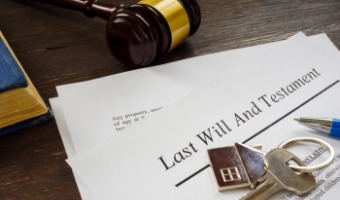
A will is one of the most commonly used estate planning documents in California. According to Estate of Spitzer (1925) 196 Cal. 301, 307–308, it demonstrates a person’s intent to create a revocable transfer of property to another when he or she dies, with no present change of ownership. Though wills are often simple documents (especially when compared to trusts, which are much more complex), they still must meet certain legal requirements for a will to be considered valid.
What constitutes a valid will? In this article, Keystone will discuss basic will requirements, as well as analyze the recent appellate court case Estate of Berger (2023) 91 Cal.App.5th 1293, in which the “harmless error” rule helped to uphold the validity of a will, despite the document’s failure to meet the typical requirements for a will.
TELL US WHAT HAPPENED. WE’LL BE IN TOUCH SOON.
What Makes a Will Legal if It’s Self-Drafted?
When creating a will, many people look to estate planning attorneys to ensure their final wishes are properly documented and enforceable. However, there are others who take matters into their own hands by drafting their own wills.
While there is greater potential for mistakes when doing so, that doesn’t mean self-drafted wills are presumptively invalid. This is true even when a self-drafted will does not fully comply with the typical legal requirements for a will.
The appellate court’s opinion in Berger demonstrates that courts should uphold wills as valid, even when they do not meet the typical will requirements, if the facts prove that the drafter of the will intended the document to be a will at the time it was created.
How Do You Make a Will Legal? — Will Requirements Explained
What are the requirements for a will to be valid? The standard method to create a valid will under California law is for the will’s creator to sign (or acknowledge his or her signature on) a typewritten/computer generated will in the presence of two independent witnesses who understand the document is intended to be the last will and testament of its creator (also known as the “testator”). Probate Code section 6110(c)(1) states that those witnesses must then add their signatures to the will
Alternatively, Probate Code section 6111 states that a person can create a will by handwriting all the material terms of the will and signing it, without any requirement that the signature be witnessed.
What Happens When a Will Fails to Meet Will Requirements?
What happens when a person types out a will on his or her computer, prints it out and signs it outside the presence of any witnesses? How do you make a will legal under such a circumstance? Is it even possible to do so?
According to Probate Code section 6110(c)(2), though such a will does not comply with the witness requirement, it may still be considered valid “if the proponent of the will establishes by clear and convincing evidence that, at the time the testator signed the will, the testator intended the will to constitute the testator’s will.”
This “harmless error” rule, as it’s known, has come into play more frequently in recent years, as courts acknowledge the increasing prevalence of estate planning documents drafted by lay persons using their computers, rather than by hand.

Applying the Harmless Error Rule to Wills
What makes a will legitimate according to the court in Berger? The appellate court’s opinion in Berger demonstrates the proper application of the harmless error rule in upholding the validity of the deceased testator’s unwitnessed, typewritten will.
Estate of Berger: Can an Unwitnessed, Typewritten Letter Be a Valid Will?
In Berger, the decedent Melanie Berger signed an unwitnessed, typewritten letter that she herself drafted, leaving her assets to her partner of approximately six months, Maria, in August 2002. The letter did not identify itself as a will, but it did state: “I, Melanie Perry Berger, with sound mind and excellent health, name Maria … as my sole beneficiary in the event of my death.”
When she executed the letter, Melanie had just proposed to Maria and was days away from having major surgery for gender reassignment. Melanie sent Maria emails discussing the letter and her desire to leave her assets to Maria. She left a copy of the letter on Maria’s desk chair within days of executing it. Melanie and Maria continued to date until Spring 2003, when their relationship ended.
Melanie passed away in November 2020, and the letter was discovered in Melanie’s desk shortly thereafter. Maria sought to probate the will (i.e., the letter), while Melanie’s sister (who, as Melanie’s sole heir, would inherit Melanie’s assets by way of intestate succession if Melanie had no will) argued that the letter was not a valid will.
Following trial, the lower court found that the letter did not constitute a will for three reasons: first, the court had “doubts about the letter and its context” due to how the letter was kept a secret from Melanie’s other family members; second, the court questioned Maria’s credibility as an accurate reporter of the facts; and third, the court questioned the nature of Melanie and Maria’s relationship and stated the possibility that Melanie may have “forgotten” about the letter in the intervening years before her death.
Does the Letter Meet the Harmless Error Rule’s Will Requirement Standards?
The appellate court reversed the lower court’s decision, holding that the facts and circumstances surrounding the creation of the letter demonstrate that Melanie intended the letter to constitute her will as a matter of law, and that the issues considered by the lower court were irrelevant to making that determination.
First, the appellate court held that extrinsic evidence is admissible to interpret whether a given document is intended to constitute a deceased person’s will. The appellate court then looked at several pieces of extrinsic evidence in determining that: “Taken together, the words in the letter itself and the circumstances surrounding its creation and execution compel the finding, as a matter of law, that Melanie intended her letter to have testamentary effect.”
Second, the appellate court considered the language of the letter itself, as it demonstrated testamentary intent by naming Maria as Melanie’s “sole beneficiary” and by giving Maria control over how to handle the assets left to her.
Third, the appellate court considered the circumstances of Melanie’s life at the time of the letter’s creation, namely the fact that Melanie executed the letter shortly before having major surgery (which could have resulted in her death) and the fact that the evidence was uncontroverted that Melanie was in love with Maria at the time the letter was executed.
Fourth, the appellate court considered the fact that Melanie kept the letter in her desk (a place where it was likely to be found) as evidence of its importance. Additionally, the appellate court factored in the unchallenged opinion of a handwriting expert as constituting proof that the letter was authentic.
Conclusion: Will at Issue Is Valid Based on the Harmless Error Rule
The appellate court reasoned that the lower court focused on “irrelevant” facts that had no bearing on the letter’s validity as a will under the harmless error rule. These included the short length of Melanie and Maria’s relationship at the time the letter was executed, and Melanie’s failure to revisit the letter and alter her estate plan in the 18 years between its creation and her death.
The appellate court stated that it is not the job of courts to question the wisdom of competent adults’ personal decisions, and that a “person’s failure to revisit a will in light of changed circumstances has nothing to do with her intent at the time she drafted the will.” (emphasis original).
The appellate court also rejected the argument of Melanie’s sister that it was suspicious the letter was found in Melanie’s desk 18 years after its creation on Melanie’s stationery. The appellate court stated this argument was speculative (especially in light of the contemporaneous emails Melanie sent to Maria corroborating the existence of the letter and the opinion of the handwriting expert that Melanie’s signature on the letter was authentic), and that the letter is exactly the type of document — ““self-drafted will[s]” that are “type19 … on the computer, print[ed] …, and sign[ed]” — for which the “harmless error” rule for wills is intended to effectuate.

Key Takeaways: Harmless Error Rule Should Be Applied to Upholding the Validity of Self-Drafted, Typewritten Wills
The appellate court’s opinion in Berger demonstrates the evidence that really matters in determining whether a will meets the harmless error rule’s clear and convincing evidence standard for validity: the terms of the will itself and the circumstances of the testator’s life at the time the will was created.
This evidence is favorable to upholding the validity of many self-drafted, typewritten wills. If evidence points to the validity of the testator’s signature on the will, the language of the will shows the testator’s intent to give property on their death, and the named estate beneficiary is someone whom the testator cared for at the time the will was created, it is likely the self-drafted, typewritten will meets the requirements of the harmless error rule.
Still, litigation is likely to arise in a scenario where an intestate heir is disinherited by a self-drafted, typewritten will, as the burden of proving the will’s validity is on the person who stands to benefit from it — and no such burden exists for beneficiaries under properly witnessed wills.
Nevertheless, in our modern age of ubiquitous computer use, it is more and more likely that self-drafted, typewritten wills will be offered for probate in coming years. The holding in Berger demonstrates the harmless error rule should be applied as a protection upholding the validity of such wills, not as a technicality that stands in the way of effectuating the testator’s true intent.
Have questions about the validity of a will? We can help you find answers.
Are you curious what counts as a will? Do you know what makes a will valid in California? Our trust and will dispute lawyers regularly handle matters surrounding the validity of estate planning documents.
We are eager to help you find a resolution to your case. Call us today to request a free consultation with one of our knowledgeable attorneys.




